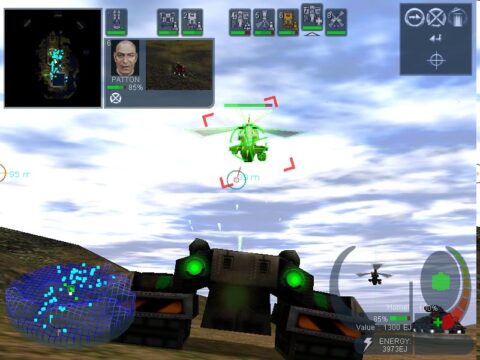
Hostile Waters
Written by: Rik
Date posted: February 10, 2008
- Genre: Strategy
- Developed by: Rage
- Published by: Rage
- Year released: 2001
- Our score: 8
It is the year 2032. The society of old, of war, greed and conflict, is but a distant memory. Deep in the Pacific, a cabal of cigar-smoking tyrants plot to destroy the peace created from the ashes of the last Great War. A world that has forgotten how to fight now needs someone to lead this new battle. It is up to you to take the helm of the last of the adaptive cruisers and travel through the chicane of cabal-controlled islands to crush their tyranny before it threatens the harmony of the new world order…
If any of that sounds like the sort of stuff that would be written on the back of the game box, that’s because it is, pretty much, although I did change one or two bits to try and make it sound a bit more dramatic. If you happen to be in a position to accurately evaluate my ability to paraphrase game box blurb, then you must be one of the three other people to have bought Hostile Waters. I’m so glad you’re here – we should be friends. Or at least form some kind of a club.
The fortunes of this game should act as proof, if ever it were needed, that a decent product and critical acclaim count for nothing if you saddle a game with a rubbish name and puke-green packaging. Despite recommendations from the UK’s two leading PC games magazines being plastered all over the front, the whole thing reeks of amateurishness – even the screenshots are rubbish – and looking at it now, it’s no surprise that the game sank (ho-ho) without trace when it was first released.
Which is a shame, because Hostile Waters is a bloody good game. Though essentially a strategy title, you also have opportunity to get onto the battlefield and control units yourself, which makes it more of a cross between something like Total Annihilation or Warzone 2100 and Hidden and Dangerous, Operation Flashpoint, or one of those new-fangled Tom Clancy’s Ghost Recon squad-based efforts. As someone who doesn’t mind a bit of Command and Conquer but normally runs screaming from any of the titles mentioned above, the fact that this one has kept me involved and entertained for the past few weeks (rather than being returned to my pile marked “impulse purchases ne’er to be played again”) is quite a considerable achievement.
The game sees you take command of the Antaeus, a mighty warship (known as an ‘adaptive cruiser’) created during more difficult times and now dusted off as peaceful mankind’s last line of defence against the sinister cabal. In between missions, Antaeus sails you to the next island in the chicane, and in-game it acts as your base of operations, sitting at a safe distance from the shore while you build and dispatch units to explore the island itself. Such island-hopping antics may sound familiar to Amiga fans, and the old 16-bit favourite Carrier Command is an obvious reference point, although those expecting a straight remake may be disappointed, with hardcore retro-bores likely to dismiss Hostile Waters as a watered-down version of their beloved classic. Frankly, they can keep their unintuitive interfaces and depressingly post-nuclear vector graphics – I know which game I’d rather play.
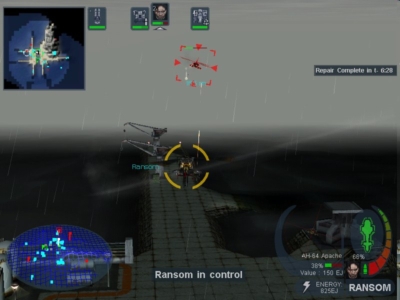
There are a good variety of missions. In this one you have to protect a prone Anteaus from attack while she gets repaired.
Speaking of which, early missions ease you in very gently. As with many other similar games, you start with a couple of tutorial-style levels and generally get fed more interesting and powerful unit options as you progress, but refreshingly, there is at least a satisfactory rationale within the plot that allows for this, in that world peace and demilitarisation has led to a distinct shortage of military expertise. For example, you don’t initially have the ability to command other units, RTS-style – you have to control everything yourself – and this is obviously a way of getting you to learn how to handle individual vehicles, but with Anteaus effectively an ageing piece of machinery that hasn’t been used in a long time, the explanation that certain systems are temporarily offline doesn’t seem contrived. Likewise, unit options are restricted because military programmes have been discontinued and your top scientists have gone missing prior to the start of the game – once you rescue them, more powerful weapons become more readily available.
Eventually, of course, you have to learn how to marshal your AI troops. If you want a vehicle to be able to behave autonomously, or according to your instructions, you need to equip it with a ‘soulcatcher’ interface, a controversial and previously-abandoned military programme that saw the minds of dead soldiers were preserved forever on a microchip – a bit like Universal Soldier in reverse. While each ‘personality’ can only be used in one vehicle at any one time, it is available to be redeployed as soon as that vehicle is destroyed or recycled.
That’s right: I said recycled. In a welcome contrast to the wasteful excesses of many RTS games, a large part of resource management in Hostile Waters involves recycling. Should any of your units be ill-equipped to perform a task, heavily damaged, or simply no longer of any use in the mission, you can send or bring it back to Anteaus for the materials to be re-absorbed and used in a brand new unit. In fact, your only source of energy throughout the game comes from recycling metals found among the abandoned buildings and factories you come across on each island. Even the debris of destroyed enemies can be absorbed. Aside from the ecologically-friendly side of this feature, in gameplay terms it allows for a degree of tactical flexibility on the battlefield, and energy is only usually wasted if you allow your units to be destroyed.
Overall, the interface works quite well, although it can take a bit of getting used to. You can give your units instructions with the mouse on the tactical map and then watch them go about their business, or hop into a unit yourself and give instructions to your AI vehicles via a series of keyboard shortcuts in a manner similar to a team-based shooter (or giving your wingman instructions in Wing Commander or TIE Fighter). Different methods suit different situations – while I generally found my colleagues pretty able to take care of themselves, some tasks were just easier if I took direct control. Incidentally, you can hop into each vehicle and override the AI at any time, so if you think one of the soulcatcher personalities is making a bit of a hash of things, you can attempt to put things right yourself with just a couple of stabs at the keyboard.
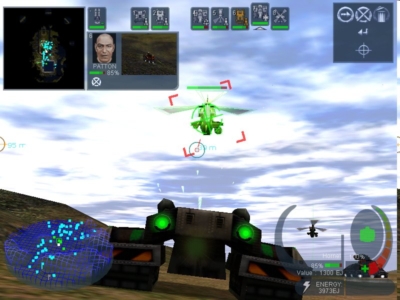
You can fit your units with different equipment and weapons. The Scarab is normally your resource collector, but it can be equipped to repair your other units mid-battle.
It’s pretty involving stuff. The ‘build and rush’ gameplay model for which many real-time strategy games have been criticised has largely been abandoned, and clear planning and thoughtful use of resources are often rewarded. However, once you’re out on the battlefield the action can come thick and fast, and you’ll need to keep a cool head under pressure, flicking between different screens, directing your vehicles, building new ones, and taking control where necessary. Whether it’s because you actually get the chance to be involved ‘on the ground’, or down to the relatively small number of units under your direction, but the overall impression when playing is that you’re involved in a serious battle, where each decision you make matters. Which has to be a good thing.
There is a plot, although it’s the kind of stuff you can either take or leave. It’s here that Hostile Waters most clearly has ‘made in England’ stamped all over it, though, and fans of late-70s/early-80s British sci-fi are in for a treat, with two of the actors from cult favourite Blake’s 7 featuring in the mission briefings, and former Doctor Who Tom Baker providing some narration during the introduction and between missions. In the case of the latter, it’s slightly unfortunate that his subsequent Little Britain voiceovers (which have been relentlessly echoed and mimicked in other TV ads and trailers) lend some unintentional comedy to proceedings. That aside, the performances are generally a cut above the usual dross you normally find in this type of game, and though some may be put of by the Britishness of the whole thing, for once it’s nice to come across something that isn’t desperately trying to re-create a Hollywood movie on a shoestring budget.
While production values on Hostile Waters are generally pretty high, with decent graphics and well put together cut-scenes complementing the voice acting, the standard occasionally dips in places. During debriefings for example, there’s no voiceover, just baldly-presented text, which is scant reward for completing a mission. On the other hand, when you receive updated objectives in-game, there’s no way to access a transcript of what’s been said, and though the new objective will appear on your list in abbreviated form, some crucial detail can be lost because the instructions just happened to cut in while your attentions were focused on a particularly frenetic firefight.
Another oversight is the paucity of information on the various ‘soulcatcher’ chips at your disposal – each personality is meant to have its own strengths and weaknesses, yet there seems to be no way of finding them out. Brief biographies are occasionally presented on loading screens, and sometimes one of them will complain if you put them in an inappropriate vehicle, but apart from that, you pretty much have to guess from their behaviour during the battle. It’s not a major fault as such, more like a missed opportunity – with only a handful of units at your disposal, fleshing out some of the characters could have been a good move.
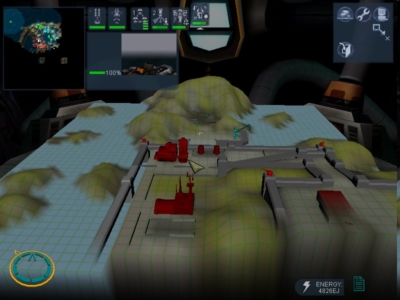
The tactical screen. Units can occasionally get lost on here, but generally it’s pretty easy to use.
Other minor complaints include a fairly unhelpful manual and a lack of subtitles during the game (this is perhaps a personal thing, but I like to have the option, and it must be a relatively easy feature to implement). It’s also worth pointing out that Hostile Waters features just one, entirely linear, single-player campaign, so strategy fans wanting the usual multiplayer and/or skirmish options are going to be disappointed.
Aside from all that, though, there’s little to find fault with. Although it’s certainly not an easy game, it has a broad appeal that means even those normally scared off by strategy titles are likely to find something to enjoy here. While it may not be one of those genre-defining titles that everyone simply must play, it remains an original and playable game that’s worth a second look for the legions of people who missed it first time around.

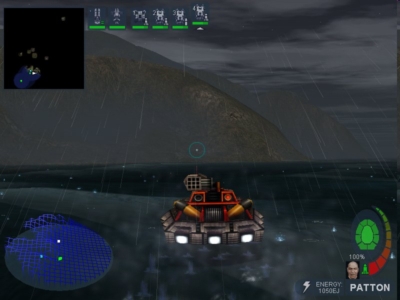

 Posts
Posts